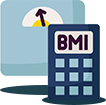By Nehha, Certified Keto Coach & Nutrition Expert | Wellness with Nehha
Introduction
You’re eating clean, exercising regularly, and yet… the scale refuses to move. Sound familiar?
If you’re stuck in a weight loss plateau despite your best efforts, the issue may not be your diet or willpower — it could be your hormones.
Hormones are the body’s chemical messengers, regulating everything from appetite and metabolism to stress and sleep. When they’re imbalanced, weight loss can feel impossible.
Let’s explore which hormones affect weight and how to work with your body—not against it—to break through the plateau.
1. Insulin Resistance: The Hidden Fat Blocker
What it does: Insulin helps shuttle glucose (sugar) into your cells for energy.
The problem: Constant carb intake, snacking, or stress can lead to insulin resistance, where cells stop responding to insulin, causing fat storage—especially belly fat.
Signs you might have it:
- Cravings for sugar and carbs
- Fat gain around the midsection
- Energy crashes after meals
What to do:
- Reduce refined carbs and sugar
- Try intermittent fasting
- Focus on protein and healthy fats
- Include movement after meals (walks help a lot)
2. Cortisol: The Stress Hormone That Stores Fat
What it does: Cortisol is released when you’re stressed.
The problem: Chronic stress = chronically high cortisol = increased belly fat and sugar cravings.
Signs:
- High appetite despite eating
- Sleep issues
- Weight gain in abdomen area
What to do:
- Prioritize sleep (7–8 hours)
- Cut back on over-exercising (yes, too much HIIT can spike cortisol)
- Practice deep breathing or meditation
- Reduce caffeine if you’re sensitive
3. Leptin & Ghrelin: Hunger & Satiety Hormones Out of Sync
Leptin tells you when you’re full.
Ghrelin tells you when you’re hungry.
If you’re always hungry or never satisfied, these might be misfiring.
Causes: Poor sleep, over-restricting calories, processed food intake.
What to do:
- Avoid extreme dieting
- Get 7+ hours of quality sleep
- Eat balanced meals with fiber, fat, and protein
- Don’t skip meals
4. Thyroid Hormones: Your Metabolism’s Control Center
An underactive thyroid (hypothyroidism) can significantly slow metabolism and make weight loss harder.
Signs:
- Fatigue
- Cold hands/feet
- Dry skin
- Slow weight loss despite good habits
What to do:
- Get your thyroid panel checked (TSH, T3, T4, antibodies)
- Focus on iodine, selenium, and zinc-rich foods
- Avoid low-calorie diets and chronic fasting
- Work with a coach (like me!) to build a personalized plan
5. Estrogen & Progesterone: Female Hormone Imbalance
For women, especially during perimenopause or PCOS, estrogen dominance or low progesterone can affect body composition and fat retention.
Signs:
- Irregular periods
- PMS or mood swings
- Fat around hips/thighs
- Water retention
What to do:
- Reduce xenoestrogens (plastics, soy, non-organic dairy)
- Support liver health (think leafy greens, cruciferous veggies)
- Focus on strength training
- Consider seed cycling and stress reduction
Key Takeaway: Weight Loss Isn’t Just About Calories In vs. Out
If your hormones are out of balance, no amount of cardio or calorie-cutting will deliver results. In fact, it may backfire.
Instead, focus on:
- Hormone-friendly meals (balanced macros, anti-inflammatory foods)
- Sleep and recovery
- Blood sugar control
- Stress management
- Long-term consistency, not extremes
Need Help Balancing Your Hormones & Losing Weight Naturally?
This is exactly what I specialize in. My programs combine:
✅ Realistic eating plans
✅ Hormone-balancing strategies
✅ Mindset work
✅ Personalized support
➡️ Book a Consultation
➡️ Follow @Ketogenic_with_Nehha for daily tips

